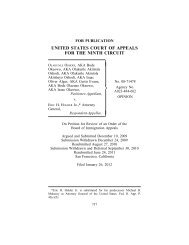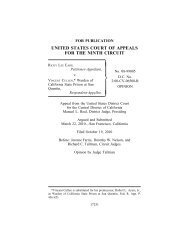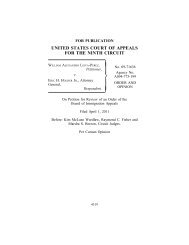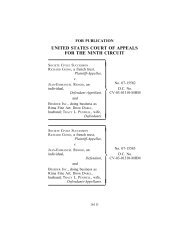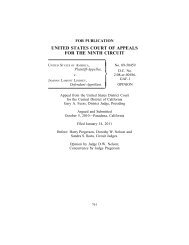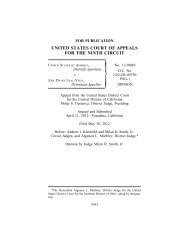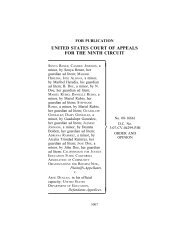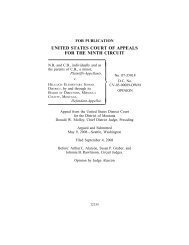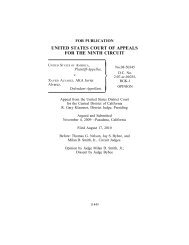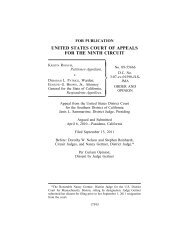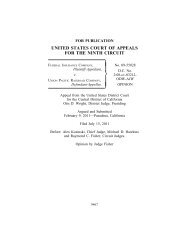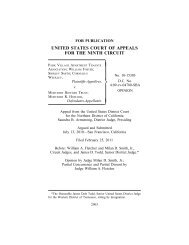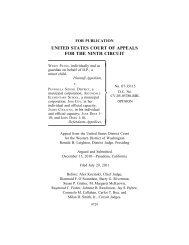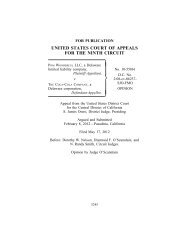ROHIT v. HOLDER - Ninth Circuit Court of Appeals
ROHIT v. HOLDER - Ninth Circuit Court of Appeals
ROHIT v. HOLDER - Ninth Circuit Court of Appeals
Create successful ePaper yourself
Turn your PDF publications into a flip-book with our unique Google optimized e-Paper software.
<strong>ROHIT</strong> v. <strong>HOLDER</strong><br />
2261<br />
some level <strong>of</strong> deference. Marmolejo-Campos v. Holder, 558<br />
F.3d 903, 909 (9th Cir. 2009) (en banc).<br />
Congress has plenary power over immigration. United<br />
States v. Hernandez-Guerrero, 147 F.3d 1075, 1076 (9th Cir.<br />
1998). “ ‘[O]ver no conceivable subject is the legislative<br />
power <strong>of</strong> Congress more complete than it is over’ the admission<br />
<strong>of</strong> aliens.” Fiallo v. Bell, 430 U.S. 787, 792 (1977), quoting<br />
Oceanic Navigation Co. v. Stranahan, 214 U.S. 320, 339<br />
(1909). In adopting the Immigration and Naturalization Act,<br />
Congress delegated significant authority to promulgate rules<br />
relating to immigration to the Attorney General and the<br />
Board. Garcia v. Holder, 659 F.3d 1261, 1266 (9th Cir.<br />
2011); see also 8 U.S.C. § 1103(g). In light <strong>of</strong> this delegation,<br />
our first task in reviewing any decision by the Board is to<br />
determine the proper level <strong>of</strong> deference to which the Board is<br />
entitled.<br />
We give significant deference to the Board “(1) ‘when it<br />
appears that Congress delegated authority to the agency generally<br />
to make rules carrying the force <strong>of</strong> law,’ and when (2)<br />
‘the agency interpretation claiming deference was promulgated<br />
in the exercise <strong>of</strong> that authority.’ ” Marmolejo-Campos,<br />
558 F.3d at 908, quoting United States v. Mead Corp., 533<br />
U.S. 218, 226-27 (2001). Under these circumstances, we must<br />
accept the Board’s interpretation if it is “ ‘based on a permissible<br />
construction <strong>of</strong> the statute.’ ” Id. at 909, quoting Chevron<br />
U.S.A., Inc. v. Natural Res. Def. Council, Inc., 467 U.S.<br />
837, 843 (1984). Because the term “moral turpitude” is “the<br />
quintessential example <strong>of</strong> an ambiguous phrase,” id., we<br />
apply Chevron deference to the Board’s interpretations <strong>of</strong> that<br />
term in its precedential decisions. Id. at 911. Where the Board<br />
has determined “that certain conduct is morally turpitudinous<br />
in a precedential decision, we apply Chevron deference<br />
regardless <strong>of</strong> whether the order under review is the precedential<br />
decision itself or a subsequent unpublished order that<br />
relies upon it.” Id.



